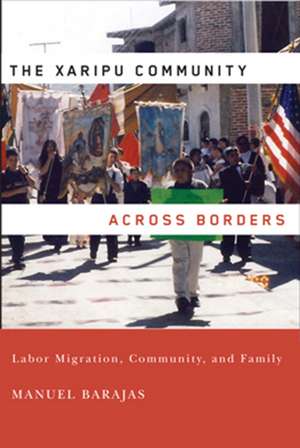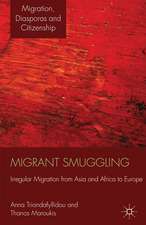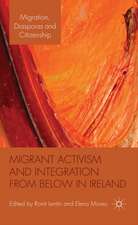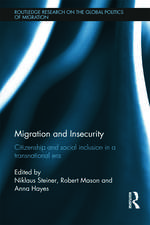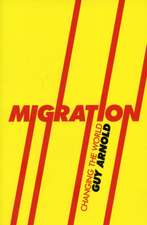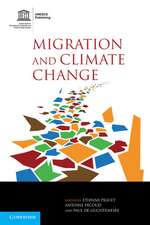The Xaripu Community across Borders – Labor Migration, Community, and Family: Latino Perspectives
Autor Manuel Barajasen Limba Engleză Paperback – 16 ian 2009
During the past three decades there have been many studies of transnational migration. Most of the scholarship has focused on one side of the border, one area of labor incorporation, one generation of migrants, and one gender. In this path-breaking book, Manuel Barajas presents the first cross-national, comparative study to examine a Mexican-origin community’s experience with international migration and transnationalism. He presents an extended case study of the Xaripu community, with home bases in both Xaripu, Michoacán, and Stockton, California, and elaborates how various forms of colonialism, institutional biases, and emergent forms of domination have shaped Xaripu labor migration, community formation, and family experiences across the Mexican/U.S. border for over a century.
Of special interest are Barajas’s formal and informal interviews within the community, his examination of oral histories, and his participant observation in several locations. Barajas asks, What historical events have shaped the Xaripus’ migration experiences? How have Xaripus been incorporated into the U.S. labor market? How have national inequalities affected their ability to form a community across borders? And how have migration, settlement, and employment experiences affected the family, especially gender relationships, on both sides of the border?
“The Xaripu Community is an exciting, refreshing, and critical ethnographic study that breaks new ground for theorizing transnational migration experiences and gender relationships across borders and challenges monolithic characterizations of Mexican migrants. Presenting a nuanced critique of previous frameworks, Barajas puts forward innovative assertions and arguments for an ‘interactive colonization’ framework that will have repercussions on debates about the Mexican migration experience in the United States.” —Mary Romero, Arizona State University“This interesting work aims to develop a framework for understanding how the intersection of racism, patriarchy, and economic oppression affects labor migration, community formation, and gender dynamics among the Xaripu across borders. It contributes to our understanding of another facet of the Mexican experience of migration.” —Cecilia Menjivar editor of Latinos/as in the United States: Changing the Face of América
“Manuel Barajas does a masterful job of integrating various theoretical perspectives to provide us a more sophisticated understanding of one particular transnational community. His model of interactive colonialism draws from such diverse conceptual and methodological traditions as neocolonialism and internal colonialism, globalization theory, network theory, gender relations, and historical materialism. At the same time, his approach is firmly grounded in the specific experience of the transborder Xaripu community, based in both Mexico and California. The complexity of his framework is a necessary reflection of the multiple economic and social factors that are shaping this type of emergent globalized community.” —Mario Barrera, University of California, Berkeley
| Toate formatele și edițiile | Preț | Express |
|---|---|---|
| Paperback (1) | 277.53 lei 6-8 săpt. | |
| MR – University of Notre Dame Press – 16 ian 2009 | 277.53 lei 6-8 săpt. | |
| Hardback (1) | 696.26 lei 6-8 săpt. | |
| MR – University of Notre Dame Press – 14 ian 2022 | 696.26 lei 6-8 săpt. |
Preț: 277.53 lei
Nou
Puncte Express: 416
Preț estimativ în valută:
53.12€ • 57.72$ • 44.65£
53.12€ • 57.72$ • 44.65£
Carte tipărită la comandă
Livrare economică 21 aprilie-05 mai
Preluare comenzi: 021 569.72.76
Specificații
ISBN-13: 9780268022129
ISBN-10: 0268022127
Pagini: 334
Dimensiuni: 156 x 228 x 26 mm
Greutate: 0.45 kg
Ediția:1st Edition
Editura: MR – University of Notre Dame Press
Seria Latino Perspectives
ISBN-10: 0268022127
Pagini: 334
Dimensiuni: 156 x 228 x 26 mm
Greutate: 0.45 kg
Ediția:1st Edition
Editura: MR – University of Notre Dame Press
Seria Latino Perspectives
Recenzii
“This is a very good book that will appeal to Mexican American historians, sociologists, and those interested in the experiences of Mexican immigrants. What makes this study unique is the binational, cross-border comparative perspective. Barajas does what only a handful of Mexican/Mexican American scholars have done; he shows the ways in which the home country has continued to influence and reinforce the social and cultural identity of immigrants.”
" . . . By using the case of Xaripus on both sides of the border and the different forms of subordination over time, this is a much-needed book that makes critical contributions to the study of migration, families, gender and Latinos in the United States."
". . . A major contribution of the book, besides the analysis of Xaripu migration to the United States, is that it offers ethnographic materials that help differentiate indigenous from mestizo migration. It is a useful book for advanced undergraduate and graduate studies in migration."
Notă biografică
Manual Barajas is associate professor of sociology at California State University, Sacramento.
